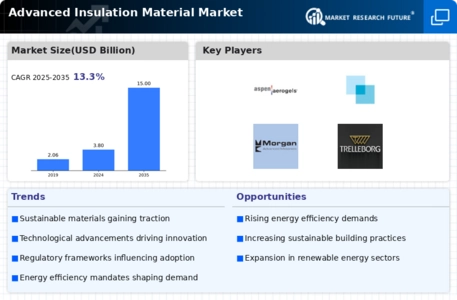Top Industry Leaders in the Advanced Insulation Material Market

The advanced insulation market, encompassing materials and technologies that offer superior thermal performance compared to traditional options, is experiencing a surge in demand driven by rising energy costs, stringent building regulations, and growing environmental concerns. This dynamic landscape is characterized by fierce competition among established players and innovative startups, all vying for a slice of the pie. Let's delve into the key strategies, market share influencers, industry news, and recent developments shaping this exciting market.
Strategies for Success:
-
Product Innovation: Leading players like Owens Corning and Saint-Gobain are constantly innovating, developing new materials with enhanced thermal conductivity, fire resistance, and sustainability. Examples include vacuum insulation panels (VIPs) with minimal thermal loss and bio-based insulation made from recycled materials. -
Market Specialization: Companies are focusing on specific application segments, such as residential construction, industrial facilities, or cold chain logistics, to cater to unique needs and offer tailored solutions. Rockwool, for instance, excels in high-temperature applications, while BASF targets the automotive industry with lightweight and fire-resistant insulation materials. -
Vertical Integration: Integrating production processes from raw material sourcing to finished product manufacturing provides greater control over quality and cost, as seen with Knauf's vertically integrated mineral wool production chain. -
Partnerships and Acquisitions: Collaborations with research institutions, technology providers, and construction companies accelerate innovation and market penetration. Recent examples include Dow Chemical's partnership with Kingspan to develop advanced insulation for data centers and Knauf's acquisition of the XPS foam insulation business of CertainTeed. -
Sustainability Focus: With green building practices gaining traction, companies are emphasizing the eco-friendly credentials of their products. This includes using recycled materials, reducing embodied carbon, and offering products with high lifespan and recyclability.
Factors Influencing Market Share:
-
Brand Recognition and Reputation: Established brands like Rockwool and BASF hold an advantage due to their long-standing reputation for quality and reliability. However, innovative startups can disrupt the market with niche offerings and competitive pricing. -
Geographical Presence: Companies with strong regional presence and distribution networks have a clear advantage. Asia-Pacific, driven by rapid urbanization and government initiatives, is a key growth market attracting significant investment from global players. -
Cost-Effectiveness: Balancing performance with affordability remains crucial. Companies are developing cost-efficient solutions, such as thin-film insulation, to cater to budget-conscious segments. -
Regulations and Standards: Complying with stringent building codes and energy efficiency regulations is essential. Companies that actively engage with regulatory bodies and develop compliant solutions gain a competitive edge.
Key Players:
- Aspen Aerogels
- Cobot Corporation
- 3M
- Advanced Insulation Limited
- Aerogel Technologies
- Guangdong Alison Hi-Tech
- Morgan Advanced Materials
- Unifrax
- LUYANG ENERGY-SAVING MATERIALS
- Aegion Corporation
- Armacell International Holding
- Trelleborg
- AFGlobal
Recent Developments:
August 2023: Kingspan announces the launch of its Kooltherm K17+, the thinnest ever high-performance phenolic insulation board, ideal for space-constrained applications.
November 2023: The European Commission proposes a new Ecodesign regulation for construction products, including mandatory minimum performance requirements for insulation materials, further boosting demand for advanced solutions.
December 2023: The International Association for Heat and Mass Transfer (IAHTM) hosts a conference showcasing cutting-edge advancements in advanced insulation technologies, attracting leading researchers and industry experts.










